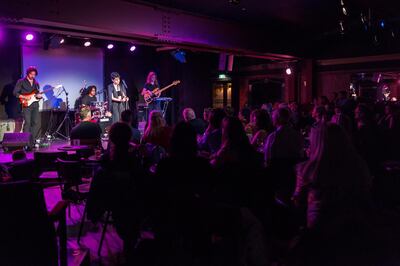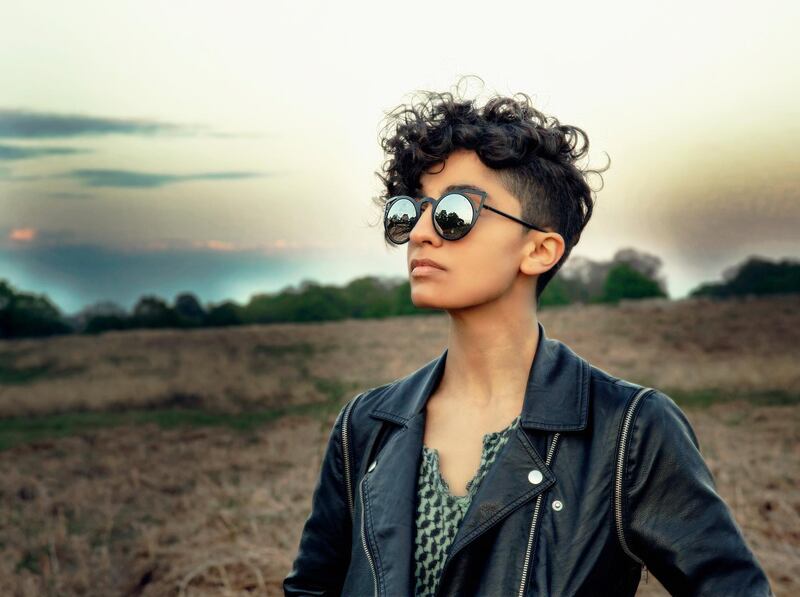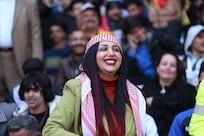Juliana Yazbeck is talking about her last gig with the kind of brash, unblinking confidence that, you suspect, can only come from being born in New Jersey. "We got to Liverpool and I said to the band: 'This is it. We're gonna kill it. Y'all ready?' It was, like, one of those 'you have to be there' moments. And the gig was so good. Off the hook. Magic."
The thing is, those who actually went to see Yazbeck – whose Lebanese parents returned to post-war Lebanon when she was six– at the Liverpool Arab Arts Festival earlier this month, said exactly the same things. They took to Twitter to call her voice "beautiful", "powerful", "breathtaking". There's a tangible sense of momentum to Yazbeck's career as her debut album Sungod, self-released last year and featuring a fantastic combination of traditional Arabic sounds, electronica, rock and hip-hop, finally gains traction. "It's snowballing," she says, ahead of another major gig on Sunday at the National Theatre River Stage in London, her home town these days, as part of the Shubbak Festival.

Yazbeck deserves the acclaim and, by the way, isn't the least bit cocky about it. When she tells me she's in love with her album, it's not meant narcissistically, it's merely a reflection of a musician who is thrilled she has made a record that is a deep "cementing of my identity".
Sungod takes on some big issues – most notably gender inequality and the immigrant experience – but it's also a spiritual, almost transcendental record. Diverse, too. "People often ask me whether it mirrors my mixed upbringing, but actually I think it's more of a reflection of my listening habits," she says.
“My Spotify playlist wouldn’t make sense to anyone in the world apart from me! I’ll obsess over Irish singing, indigenous American drumming, electronica from Scandinavia, traditional Arabic music. All of this makes sense for me because it comes from a place of deep truth, it’s very rooted in culture and it’s indigenous. There’s something unifying about that, I think.”
Which is why Yazbeck was keen that Sungod has tracks in Arabic and English, and also why she's unapologetic about not translating them. It's a statement of empowerment, and recognition that not everything has to be Anglocentric.
"To be honest, I know the listeners don't care," she says. "Acts like Ibeyi sing in French, Spanish and Yoruba as well as English. Eivor is a singer-songwriter in Faroese, Icelandic, Danish, Swedish and English. They're not shoved into the world music niche – they're completely mainstream. If you don't understand the words, that doesn't mean you don't get the emotional scope of the music. So yeah, it's a small act to sing in Arabic, but it feels like I'm claiming my space."
Actually, the whole process of writing in Arabic was a major turning point for Yazbeck. She admits that as an immigrant child, she wanted to assimilate, move away from her culture. "Be white, basically", she laughs.
So Yazbeck grew up doing musical theatre and jazz, and never considered singing in Arabic. But as she began the spiritual journey that is a key part of the record, she realised something was pulling her back to her ancestors. The key to enjoying Sungod is that it can channel those historic sensations – most notably in the opening track Aqef Fi Beirut – but then move forward into the 21st century.
“We can’t separate ourselves from our heritage and the legacies of those who came before us,” she agrees. “It’s our duty to understand it, to know it, to work with it, to heal the parts that need to be healed and carry that forward into the future – in an uplifting way. The type of music I make – electronic elements, the beats, the hip-hop poetry, the spoken word – also makes a lot more sense to me than just super traditional Arabic music.”
And Sungod has already been uplifting. Yazbeck wanted the record to have a message of empowerment for young women and immigrants, "plant the seeds for the future", as she puts it, and the messages she's received from her target audience suggest she has struck a chord.
“To have someone write to you and say: ‘this was a life changing moment, I will never look at myself in the same way’ … wow, that was the biggest honour I could have. It made me so happy. I searched for something for so long, for a voice, for a style of music. I couldn’t find a place to belong. But maybe the fact this kind of record didn’t exist before now … maybe it was my divine purpose, to make it myself. It became like a rite of passage.
“I see so many other young women in the same place; rather than feel ashamed about who we are and our background, we can claim it as our purpose.”
So is Sungod a political album? Yazbeck has to pause to consider the scope of a six-track, 26-minute record. "Well, whether I like it or not, my existence in this world is political. The record challenges the status quo, so of course it's political, too. And good – it should be. I don't shy away from the word political, because isn't everything these days, particularly for people like me? So many people have this experience of being immigrants or refugees, of living in multiple places or speaking multiple languages. So why do we still feel marginalised, ashamed, lost?"
The great achievement of Sungod is that it crystallises these feelings, but with a deftness of touch and, sometimes, pop sensibility that steers the record well away from suffocating polemic. So it makes perfect sense when Yazbeck – who is working on new material and planning a new tour for later this year – has a giggle about her dream collaborators and gigs.
“I’m a fan of musicians who make art for the sake of changing the world,” she says. “So Hozier, the Irish dude. I’m mad about his album. Eivor, who I mentioned before. A Tribe Called Red, a first nation Canadian electronic duo, 27 Soul, a Palestinian electronic band … I could go on and on.
"And there's a beautiful festival in my home town in Lebanon, Batroun. It's what the song Little Home on the album is about. So we have to play there. It would be my dream.
“But I’m ready for anything,” she laughs. “I’m like, bring on the blessings. Let’s do this.”






